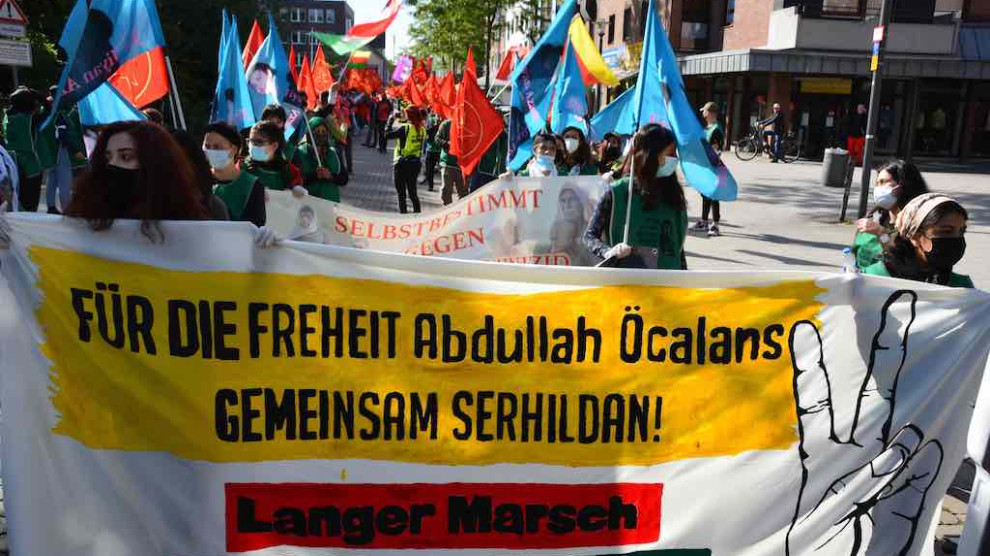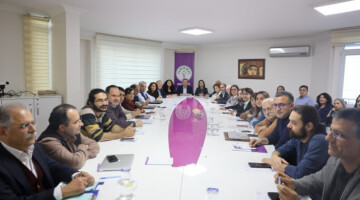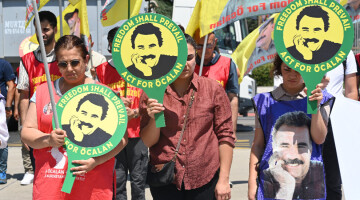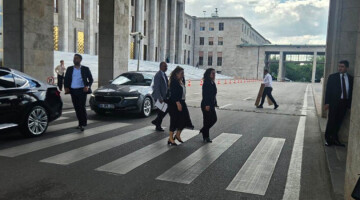The long march of the Kurdish youth movement for the freedom of Abdullah Ocalan, which started on Saturday in Hanover, started the second stage in Lehrte with even greater participation than the day before. Before the start, some of the participants passed the time dancing together, others held discussions among themselves. Afterwards, everyone came together to plan the schedule for today. Like the day before, warnings of possible provocations were issued.
At 10:30 a.m. a minute's silence was held in memory of all the martyrs of the revolutionary struggle. Afterwards the activists set off with music and slogans in the direction of Celle. Today's distance is 15 kilometers.
The second day of the long march is dedicated to 15-year-old Arcan Hussein Khalaf. The young Yazidi boy from Shengal (Sinjar), who survived the genocide of the ISIS in 2014, was stabbed to death by a German citizen in Celle in April. The trial against the perpetrator is scheduled to begin this fall. In order to draw attention to the racist murder, a banner with the inscription "Self-organization against racism in Germany and everywhere" is carried at the demonstration.
From Celle, the long march will continue via Unterlüß, Lüneburg, Winsen (Luhe) and Harburg, arriving in Hamburg on September 11.
Background
The "Long March" (kurd. Meşa Dirêj) is a traditional event of the Kurdish youth movement organized throughout Europe. The main goal of the demonstration is to draw attention to the situation in Kurdistan and to the situation of Abdullah Öcalan. The PKK founder and mastermind of the Kurdish liberation movement, who is considered the most important political representative of the Kurds, was deported from Kenya to Turkey more than two decades ago in a coordinated action involving many states and secret services. Kurdish society calls this phase the "international conspiracy". Since his hostage-taking, Öcalan has been kept in isolation on the Turkish prison island of Imrali in the Sea of Marmara, under an unprecedented detention regime aimed at physical and mental extermination. This torture, which has lasted for many years, is aggravated by further restrictions on the conditions of imprisonment. There is serious cause for concern about the life of the 72-year-old leader.
Abdullah Öcalan is against separatism and secessionism. He offers a contemporary and democratic social alternative to existing reactionary, anti-democratic mentalities and forms of rule not only for the Kurdish people, but for the entire Middle East. Despite inhumane prison conditions at Imrali, he tries to counteract the warlike conflicts in the region by developing proposals to solve the Kurdish question. With a paradigm shift, he has already created the basis for removing nationalism, oppression, war and exploitation from the region.
Despite the efforts to limit the damage, the nation states are all the more committed to getting the long-lasting crisis completely out of control. The Turkish state in particular is counting on a continuation of the war and the destruction of the Kurdish identity to guarantee its own existence. With their march, the young people therefore demand the abolition of the solitary confinement on Imrali and conditions for Öcalan, in which he can live and work freely, in order to contribute to the solution of the Kurdish question and all other problems in the Middle East. Especially in view of the Turkish invasions in southern and western Kurdistan, the march should also be understood as a clear message to all European governments that maintain military, foreign policy and economic relations with Turkey. "As Kurdish and internationalist youth, we unite in order to jointly resist against capitalism, fascism and colonialism in order to achieve great victories, said the organizing committee.













